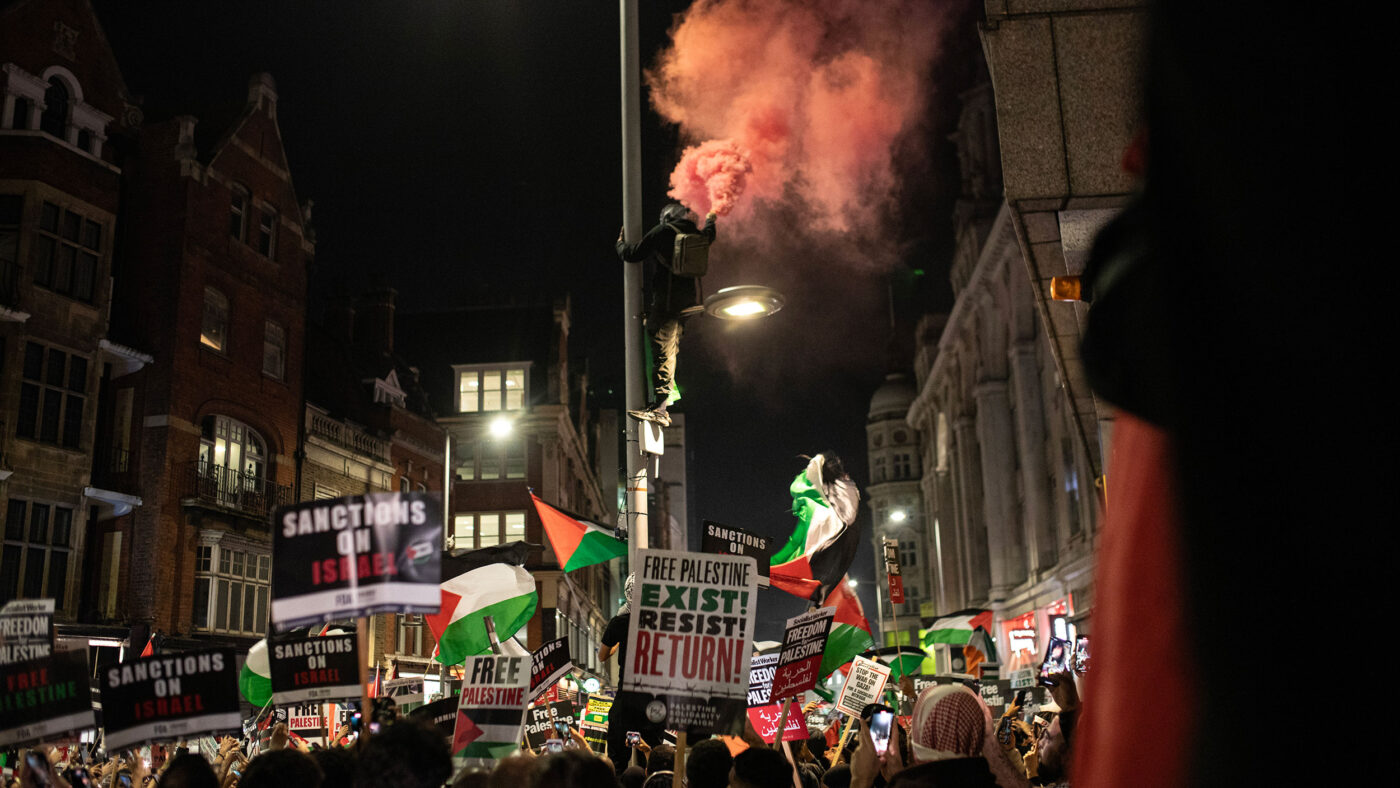When the Metropolitan Police was established in 1829, its progenitor, the then Home Secretary Sir Robert Peel, ensured that its ability to maintain law and order and to prosecute criminality rested immutably on the approval and respect of the people. He would repeat ever after the aphorism, ‘The police are the public and the public are the police’.
These Peelite principles of policing have seemed at best theoretical over the past few days. In the wake of shocking, violent attacks on Israel by Palestinian terrorist group Hamas, hundreds of pro-Palestine activists gathered at the Israeli embassy in Kensington to celebrate, chanting, ‘Israel is a terrorist state’ and ‘Allahu akbar’. A firework was also set off in the direction of the embassy building, almost mimicking the rockets fired by Hamas.
All of this happened hours after Hamas terrorists had kidnapped more than 100 Israeli civilians, mainly women and children; there were reports of widespread rape of civilians at a music festival; one 22-year-old woman was stripped and thrown into the back of a truck, her legs possibly broken, where Hamas terrorists spat on her. Her fate is still unknown.
In London, Metropolitan police officers stood back from the protest. A spokesman stressed their determination that ‘all communities are supported and reassured’, and conceded that the demonstration ‘could lead to people feeling threatened’, but emphasised, clutching police-issue pearls, ‘We have zero tolerance for any hate crimes’.
This ‘zero tolerance’ approach was hard to see a few miles away in Golders Green. Pita, a kosher restaurant, was smashed up and vandalised in the early hours of Monday morning. The windows were broken and the cash register stolen, while metres away the slogan ‘Free Palestine’ has been sprayed on to a rail bridge. Again, the Met’s response has been cautious. ‘At this stage, the incident is not being treated as a hate crime.’
Let us be fair, though. Policing by consent is a tough business, fraught with decisions which must at some points seem impossible. It is extraordinary, but wonderful, that we still maintain law and order in Britain within such a consensual framework. Only 6,000 of the 142,000 police officers in England and Wales are licensed to carry firearms, and in 2022/23, the number of people fatally shot by police was three. The previous year, it was two.
Nevertheless, the Metropolitan Police is a force in deep crisis. Three of the last four commissioners have been forced to resign and it was revealed earlier this year that 800 serving officers are facing investigation for sexual misconduct or domestic abuse. Similarly, the force still faces serious and all-too-credible charges of institutional racism and sexism.
Memories are still fresh of a vigil held on Clapham Common in March 2021 for Sarah Everard, a young woman who had been abducted, raped and murdered by Wayne Couzens, an off-duty Metropolitan Police officer. The vigil came during Covid, and was in breach of the regulations. However, the Duchess of Cambridge visited that afternoon to express her support. By 6pm, the crowd numbered several hundred. The designated Gold Commander, Deputy Assistant Commissioner Matt Twist, made the decision to break up the crowd.
Given the circumstances of Everard’s murder, the dispersal of a largely peaceful crowd by a majority male police presence was a public relations disaster. The then commissioner, Dame Cressida Dick, was rightly and heavily criticised, and would be gone in a year. Most of all, however, it brought to the surface every foolish and thoughtless judgement the Metropolitan Police had collectively made, with memories reaching back to the murder of Stephen Lawrence in 1993 and the Macpherson Report of 1998 which notoriously applied the term ‘institutional racism’ to the force.
The decisions the police make, and the way they are perceived, are absolutely critical for an organisation as besieged as the Met. No one doubts the difficulties individual police officers face. The force is caught between a rock and a hard place. On one side is a populist home secretary who is imploring officers to toughen up, and on the other is a perceived ‘woke’ orthodoxy expressed in police cars being painted with rainbow flags and officers dancing with climate protesters while supervising their demonstration. It is a hard balance to strike but no one should join the police for an easy life, and the current commissioner of the Metropolitan Police, Sir Mark Rowley, is paid just shy of £300,000 for his troubles.
The Met cannot keep getting these decisions wrong and exposing itself to ridicule, because we are not far from a situation in which general regard for the police simply collapses. Among some communities it is already tottering, and Baroness Casey reported earlier this year that more Londoners now distrusted than trusted the police.
The police must own this. The response to the protest in Kensington and the vandalism in Golders Green will have struck many as indulgent of Islamic extremism and indifferent towards the Jewish community. Whatever the intentions of the police officers, appearances are important, and the Metropolitan Police, from senior leadership to bobbies on the beat, must understand this. If they don’t, it is hard to imagine just how calamitous the consequences could be.
Click here to subscribe to our daily briefing – the best pieces from CapX and across the web.
CapX depends on the generosity of its readers. If you value what we do, please consider making a donation.


